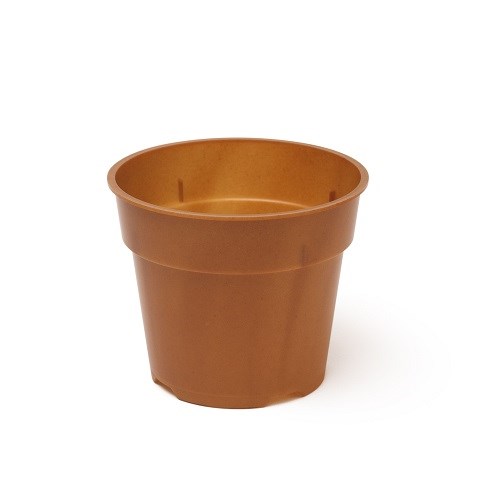5 Year Study Culminates In Viable Biobased Plant Containers
The Center for Bioplastics and Biocomposites has come up with a sustainable replacement for petroleum-based plant pots.

The Center for Bioplastics and Biocomposites (CB2), Ames, Iowa, has been successful in developing a viable and sustainable biobased replacement for petroleum-based plant containers. In fact, the new Bio-Res PLA renewable and compostable pots were fabricated at NPE2015 last month.
The plastic used is a blend of PLA and Bio-Res, a biobased enhancer developed by CB2 industry member Laurel Biocomposites, Laurel, Nebraska. It is made from distillers grains using a proprietary process. The initial product Bio-Res powder is high purity and characterized by controlled particle size and color (light yellow). This renewable and biodegradable feedstock can be blended with thermoplastics and thermosets in a variety of applications. Laurel also now offer a 20% Bio-Res filled HDPE masterbatch and has a PP masterbatch under development.
The Bio-Res PLA plant pots are part of a five-year study, supported by a U.S. Department of Agriculture grant, of the production and performance of various bioplastic pots led by CB2 faculty members at Iowa State University. “These biobased plant containers are a viable and sustainable replacement for the petroleum-based pots currently used,” says David Grewell, director of CB2 and professor of agricultural and biosystems engineering at Iowa State.
At NPE2015, attendees had the opportunity to see the containers made with an injection molding machine and an integrated end-of-arm-tooling robot. Wittmann Battenfeld provided CB2 with the molding machine and auxiliary equipment and VistaTek provided the plant container mold. “We saw this as a great opportunity for industry and users, including gardners, to see these pots firsthand…the hope it to develop industrial collaborations that will lead to long-term acceptance of this novel product,” says Grewell.
CB2 is a National Science Foundation Industry & University Cooperative Research Center that brings together industry partners and university researchers who have a common interest in biobased plastics and composites. It is led by Iowa State University with Washington State University as a site. Organizations interested in the market introduction of economically viable biobased products are encouraged to joint CB2 and its 23 industry partners.
Want to find or compare materials data for different resins, grades, or suppliers? Check out Plastic Technology’s Plaspec Global materials database.
Related Content
-
Automotive Awards Highlight ‘Firsts,’ Emerging Technologies
Annual SPE event recognizes sustainability as a major theme.
-
ABC Technologies to Acquire Windsor Mold Group Technologies
The Tier One automotive supplier with compounding and blowmolding machine capabilities adds the 50-yr-old molder and moldmaker.
-
How to Optimize Injection Molding of PHA and PHA/PLA Blends
Here are processing guidelines aimed at both getting the PHA resin into the process without degrading it, and reducing residence time at melt temperatures.
















